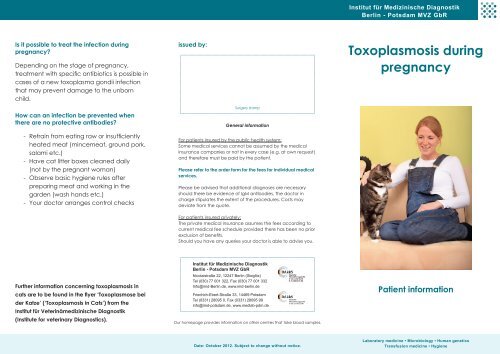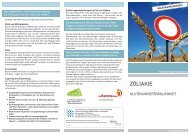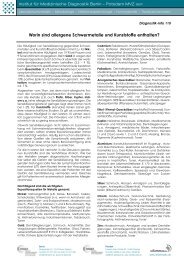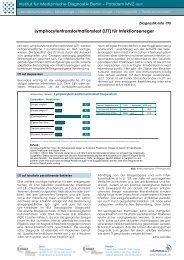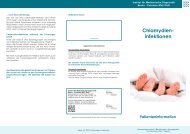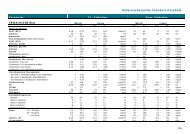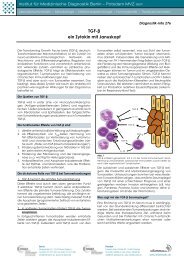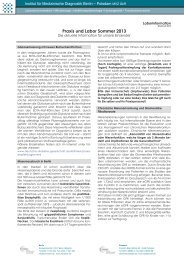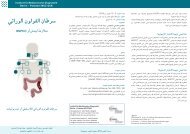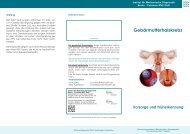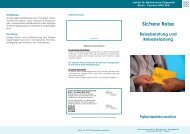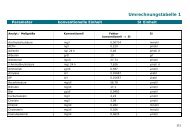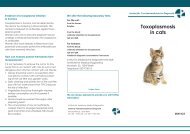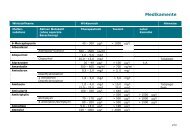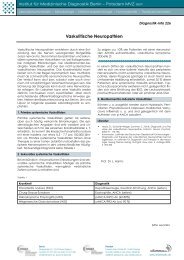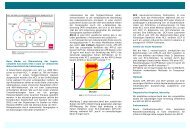Toxoplasmosis during pregnancy - IMD Berlin
Toxoplasmosis during pregnancy - IMD Berlin
Toxoplasmosis during pregnancy - IMD Berlin
Create successful ePaper yourself
Turn your PDF publications into a flip-book with our unique Google optimized e-Paper software.
Institut für Medizinische Diagnostik<br />
<strong>Berlin</strong> - Potsdam MVZ GbR<br />
Is it possible to treat the infection <strong>during</strong><br />
<strong>pregnancy</strong>?<br />
Depending on the stage of <strong>pregnancy</strong>,<br />
treatment with specific antibiotics is possible in<br />
cases of a new toxoplasma gondii infection<br />
that may prevent damage to the unborn<br />
child.<br />
issued by:<br />
<strong>Toxoplasmosis</strong> <strong>during</strong><br />
<strong>pregnancy</strong><br />
How can an infection be prevented when<br />
there are no protective antibodies?<br />
- Refrain from eating raw or insufficiently<br />
heated meat (mincemeat, ground pork,<br />
salami etc.)<br />
- Have cat litter boxes cleaned daily<br />
(not by the pregnant woman)<br />
- Observe basic hygiene rules after<br />
preparing meat and working in the<br />
garden (wash hands etc.)<br />
- Your doctor arranges control checks<br />
Surgery stamp<br />
General information<br />
For patients insured by the public health system:<br />
Some medical services cannot be assumed by the medical<br />
insurance companies or not in every case (e.g. at own request)<br />
and therefore must be paid by the patient.<br />
Please refer to the order form for the fees for individual medical<br />
services.<br />
Please be advised that additional diagnoses are necessary<br />
should there be evidence of IgM antibodies. The doctor in<br />
charge stipulates the extent of the procedures. Costs may<br />
deviate from the quote.<br />
For patients insured privately:<br />
The private medical insurance assumes the fees according to<br />
current medical fee schedule provided there has been no prior<br />
exclusion of benefits.<br />
Should you have any queries your doctor is able to advise you.<br />
Further information concerning toxoplasmosis in<br />
cats are to be found in the flyer ‘Toxoplasmose bei<br />
der Katze’ (‘<strong>Toxoplasmosis</strong> in Cats’) from the<br />
Institut für Veterinämedizinische Diagnostik<br />
(Institute for veterinary Diagnostics).<br />
Institut für Medizinische Diagnostik<br />
<strong>Berlin</strong> - Potsdam MVZ GbR<br />
Nicolaistraße 22, 12247 <strong>Berlin</strong> (Steglitz)<br />
Tel (030) 77 001 322, Fax (030) 77 001 332<br />
Info@imd-<strong>Berlin</strong>.de, www.imd-berlin.de<br />
Friedrich-Ebert-Straße 33, 14469 Potsdam<br />
Tel (0331) 28095 0, Fax (0331) 28095 99<br />
info@imd-potsdam.de, www.medlab-pdm.de<br />
Our homepage provides information on other centres that take blood samples.<br />
Patient information<br />
Date: October 2012. Subject to change without notice.<br />
Laboratory medicine • Microbiology • Human genetics<br />
Transfusion medicine • Hygiene
What is toxoplasmosis?<br />
<strong>Toxoplasmosis</strong> is a contagious disease caused<br />
by the parasite Toxoplasma gondii.<br />
Humans are infected by oral ingestion at<br />
various stages of the parasite’s life, especially<br />
by consuming raw or insufficiently cooked meat<br />
containing cysts (mincemeat, salami). Cat<br />
faeces (e.g. via cat litter, sand or garden work)<br />
may cause ingestion of toxoplasma oocysts.<br />
Infection channels<br />
Cats (definitive host)<br />
Cat faeces<br />
Infection via oocysts in the earth<br />
Infection through meat<br />
containing oocysts<br />
Intrauterine Infection<br />
Infection of humans and warmblooded<br />
mammals occurs globally. In Germany ca. 70%<br />
of the population are diseased in the 60-65 age<br />
group.<br />
How do I recognise a toxoplasma gondii<br />
infection?<br />
Infection normally takes place without<br />
symptoms. Therefore there is no feeling of illness.<br />
Flu-like symptoms such as swelling of the lymph<br />
node, headache and muscle pain and general<br />
exhaustion are rare.<br />
Should a woman become infected with<br />
toxoplasma gondii <strong>during</strong> <strong>pregnancy</strong> the<br />
parasite may be passed on to the unborn child.<br />
Depending on the stage of the <strong>pregnancy</strong>,<br />
harm to the child is possible (cramps, change<br />
to the eyes, stillbirth).<br />
How does the diagnosis take place?<br />
The body produces specific antibodies in cases<br />
of infection by toxoplasma gondii.<br />
Evidence of IgG antibodies (protecting<br />
antibodies) indicates infestation by toxoplasma<br />
gondii. This does not constitute a risk for the<br />
unborn child.<br />
Evidence of IgG and IgM antibodies against<br />
toxoplasma gondii may indicate a recent<br />
infection.<br />
IgM antibodies may however still be detected<br />
years after an infection which initially is no<br />
reason for concern. Additional tests are<br />
necessary to confirm a new infection (e.g.<br />
avidity determination). This diagnosis is paid<br />
by your health insurance.<br />
When should determination of antibodies take<br />
place?<br />
Determination of IgG antibodies should take<br />
place optimally 3-4 months before or after<br />
<strong>pregnancy</strong>.<br />
There is danger for the unborn child should<br />
protecting antibodies be determined.<br />
Should you not possess protective antibodies<br />
then antibody checks (in 8-12 week intervals)<br />
should ensue <strong>during</strong> the entire <strong>pregnancy</strong>.


